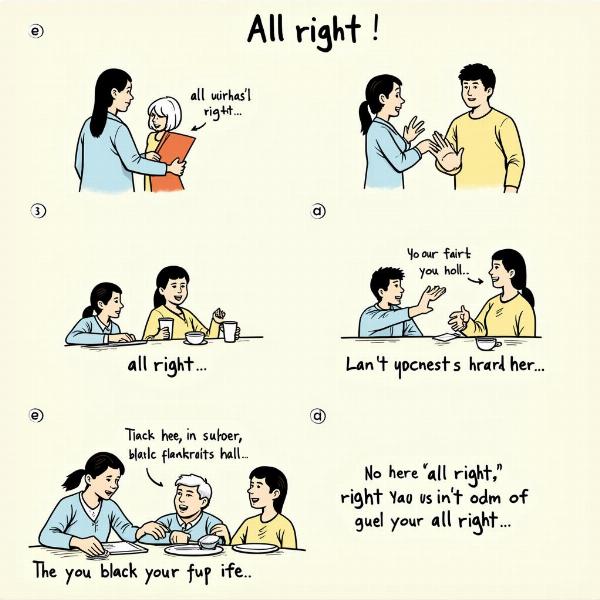Understanding the nuances of “all right” in Hindi can be tricky. This phrase, common in English, doesn’t have a single, perfect equivalent in Hindi. Its meaning shifts depending on context, sometimes expressing agreement, sometimes indicating well-being, and other times serving as a mild interjection. This guide delves into the various Hindi meanings of “all right,” providing examples and cultural context to help you navigate these linguistic subtleties.
Decoding “All Right” in Hindi: Various Meanings and Usage
The beauty of language lies in its flexibility, and “all right” exemplifies this perfectly. Let’s explore its diverse interpretations in Hindi:
-
ठीक है (Theek Hai): This is perhaps the most common and versatile translation of “all right.” It can signify agreement, acceptance, or simply acknowledge something. For instance, if someone asks, “Can we meet tomorrow?” you could respond with “Theek hai,” meaning “Okay” or “All right.”
-
अच्छा (Accha): This word carries a slightly different connotation, often expressing understanding or mild surprise. It can also be used as a filler word, similar to “oh” or “well” in English. For example, if someone tells you a piece of news, you might respond with “Accha,” indicating that you’ve heard and understood.
-
सही है (Sahi Hai): This translates to “correct” or “right.” It’s often used when confirming information or expressing agreement with a statement. For instance, if someone says, “The meeting is at 2 PM,” you might reply, “Sahi hai,” confirming that the information is correct.
-
कोई बात नहीं (Koi Baat Nahi): This phrase is used to dismiss a minor issue or apologize. While not a direct translation of “all right,” it can be used in similar contexts. If someone accidentally bumps into you and apologizes, you might say “Koi baat nahi,” meaning “It’s all right” or “No problem.”
Choosing the Right Hindi Equivalent: Context is Key
The best Hindi translation for “all right” depends heavily on the situation. Understanding the nuances of each option is crucial for effective communication.
-
Expressing agreement: “Theek hai” and “Sahi hai” are generally suitable for expressing agreement.
-
Indicating well-being: “Theek hai” is the appropriate choice when asking about someone’s health or well-being.
-
Acknowledging information: “Accha” is often used to acknowledge information or express mild surprise.
-
Dismissing a minor issue: “Koi baat nahi” is used to downplay a small problem or accept an apology.
Common Scenarios and Their Corresponding Hindi Phrases
Imagine you’re in India and need to use “all right” in different situations. Here are a few examples:
-
Scenario 1: Someone asks if you’re ready to leave. You can reply, “Theek hai, chalo” (All right, let’s go).
-
Scenario 2: Someone asks how you are. You can respond, “Main theek hun” (I am all right).
-
Scenario 3: Someone tells you a surprising fact. You can react with, “Accha! Mujhe nahin pata tha” (Oh! I didn’t know that).
-
Scenario 4: Someone apologizes for being late. You can say, “Koi baat nahi” (It’s all right).
 Using "All Right" in Hindi Conversations
Using "All Right" in Hindi Conversations
Mastering the Nuances: Tips for Effective Communication
Here are some additional tips to help you use “all right” effectively in Hindi:
-
Pay attention to tone and body language: Just like in English, tone and body language can influence the meaning of a phrase.
-
Practice makes perfect: The more you practice using these Hindi phrases, the more comfortable you’ll become.
-
Don’t be afraid to ask for clarification: If you’re unsure which phrase to use, don’t hesitate to ask a native Hindi speaker for guidance.
Conclusion: Navigating the Subtleties of “All Right” in Hindi
While “all right” might seem like a simple phrase, its meaning in Hindi can be multifaceted. By understanding the different Hindi equivalents and their contextual usage, you can enhance your communication skills and avoid misunderstandings. Remember, choosing the correct phrase depends on the situation and your intended message. Mastering these nuances will make your interactions in Hindi more natural and meaningful. Now that you have a better grasp of “all right” hindi meaning, you’re well-equipped to navigate various conversations with confidence.
FAQ:
-
What is the most common Hindi translation for “all right”? Theek hai (ठीक है) is the most common and versatile translation.
-
How do I say “I’m all right” in Hindi? You can say “Main theek hun (मैं ठीक हूँ).”
-
Is “accha” a direct translation of “all right”? Not exactly. “Accha” conveys understanding or mild surprise, not necessarily agreement.
-
When should I use “koi baat nahi”? Use it to dismiss a minor issue or accept an apology.
-
Why is context important when translating “all right” to Hindi? Because “all right” has multiple meanings in English, and each context requires a different Hindi equivalent.
Meaning-Hindi.in is your one-stop solution for all your Hindi translation needs. We specialize in various translation services, including business and commercial document translation, certified and legal document translation, technical and user manual translation, website and localization translation, educational and academic document translation, express translation, and specialized translation. Contact us today for accurate and culturally sensitive translations. Email: [email protected], Phone: +91 11-4502-7584. Meaning-Hindi.in is committed to delivering high-quality translations that bridge language barriers and facilitate effective communication.